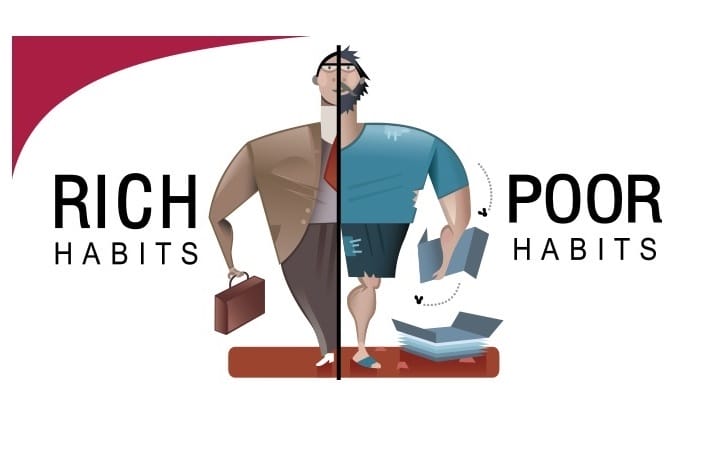
My mission is to share my unique Rich Habits research in order to add value to your life and help you realize increased wealth, superior health, abundant success, fulfillment & happiness. If you find value in these articles, please share them with your inner circle and encourage them to Sign Up for my Rich Habits Daily Tips/Articles. No one succeeds on their own. Thank You!
You’ve no doubt heard the saying “money doesn’t buy happiness”. It’s very likely you heard it from your parents or someone who was not wealthy. The problem with that ideology, is that it’s not true.
Let’s look at some of my Rich Habits Study research data:
- 82% of the wealthy in my Study said they were happy. 98% of the poor said they were unhappy.
- 87% of the wealthy in my Study said they were happy in their marriage. 53% of the poor is my Study said they were unhappy in their marriage.
- 92% of the wealthy in my Study said they were happy because they were healthy. 22% of the poor in my Study said they were unhappy because of poor health.
- 95% of the wealthy in my Study said they were happy because their children were doing well in life. 24% of the poor in my Study said they were unhappy because their children were not doing well in life.
- 94% of the wealthy in my Study said they were happy because they liked what they did for a living. 85% of the poor in my Study said they were unhappy because they did not like what they did for a living.
- 0% of the wealthy said they were unhappy due to their finances vs. 98% for the poor.
When you study these statistics, as I have, you realize wealth, or a lack of it, affects so many aspects of your life.
Poverty creates general unhappiness, stress and anxiety. It also negatively affects your marriage, causes health issues and drips down, affecting your children.
Looking at the flip side of this from my Study, wealth creates an overall sense of happiness. 87% of the wealthy are happy in their marriages. Wealthy people are also clearly healthier, which gives them a sense of well-being. Because they were able to use their wealth to help provide a superior education for their children, their children flourished and excelled in life, making them feel happy about their lives.
So when someone says “money does not buy happiness”, they’re expressing an ideology that simply is not accurate.
Your level of wealth determines your level of happiness. Wealth and poverty have a domino affect on all aspects of your life. If you improve your financial condition in life, like dominoes, that wealth affects other aspects of your life.
Let’s take a look at just one of those domino affects caused by poverty – poverty causes marital problems.
Various studies identify money problems as the leading cause of divorce in America. Researchers at Kansas State University surveyed 4,500 couples. They found fights about money are the biggest contributors to divorce.
The Huffington Post even ran a piece on the correlation between poverty and divorce not too long ago.
When it comes to marriage, money does buy marital bliss.
If you want to end your unhappiness in life, it begins by ending your poverty.
In my research I identified three strategies the self-made Saver-Investor millionaires used to accumulate their wealth:
- Live Below Your Means – In my research 94% of the wealthy stated they were wealthy because one of the Rich Habits they learned from their parents was the 80:20 Rule. They were taught to set aside 20% of their net pay, early in life, forcing them to live off the remaining 80%.
- Expand Your Means – Jay Leno famously said that he always had two jobs in life. He spent the earnings from the first job and saved the earnings from the second job. Expanding your means can be accomplished by taking on a second job, starting a side business, creating something that provides added value to others and additional income to you or prudently investing your savings.
- Do Both – Living below your means and expanding your means is what the wealthiest in my Study did.

Tom Corley is an accountant, financial planner, public speaker, and author of the books “Effort-Less Wealth: Smart Money Habits At Every Stage of Your Life” and “RichKids: How to Raise Our Children to Be Happy and Successful in Life“. Corley’s work has appeared on CNN, USA Today, The Huffington Post, SUCCESS Magazine, and many other media outlets and podcasts in the U.S. and 27 other countries. Tom is a frequent contributor to Business Insider and CNBC.





Comments